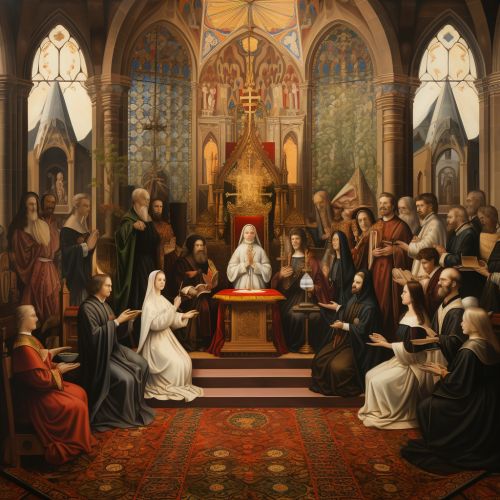Saints in the Catholic Church
Overview
The Catholic Church recognizes certain individuals as saints, a title bestowed upon those who have lived lives of heroic virtue or died as martyrs for their faith. The process of canonization, or declaring someone a saint, has evolved over centuries and involves rigorous investigation into the person's life, writings, and miracles attributed to their intercession.
History
The practice of venerating saints in the Catholic Church has its roots in the early Christian tradition of honoring martyrs. During the first three centuries of Christianity, there was no formal process for declaring someone a saint. Instead, local communities would collectively recognize and honor those who had given their lives for their faith. This practice evolved over time, and by the 10th century, the Pope had assumed authority over the canonization process.
Canonization Process
The canonization process in the Catholic Church is a lengthy and thorough investigation into the life of the individual being considered for sainthood. The process begins at the diocesan level, where a bishop investigates the candidate's life and writings for evidence of heroic virtue. This investigation includes the consultation of theologians and the faithful. If the candidate is deemed worthy, the cause is forwarded to the Congregation for the Causes of Saints at the Vatican.
The Congregation for the Causes of Saints further investigates the candidate's life and writings. If the candidate is found to have lived a life of heroic virtue, they are declared "Venerable". The next steps are beatification and canonization, which require verification of miracles attributed to the candidate's intercession. Beatification requires one miracle, while canonization requires two. These miracles are subject to rigorous investigation, often involving panels of medical experts.
Role of Saints in the Church
Saints hold a special place in the Catholic Church. They are seen as models of holiness, their lives providing examples of how to live out the Gospel values. The Church also believes that saints, being in Heaven, can intercede with God on behalf of the faithful. This belief is the basis for the Catholic practice of praying to saints.


Notable Saints
There are thousands of saints recognized by the Catholic Church. Some of the most notable include Saint Peter, the first Pope; Saint Paul, a key figure in the early Church; Saint Francis of Assisi, known for his love of nature and the poor; Saint Augustine of Hippo, a great theologian and Doctor of the Church; and Saint Therese of Lisieux, a young Carmelite nun who is one of the most popular saints of modern times.
Controversies and Criticisms
The canonization process and the veneration of saints have not been without controversy. Critics argue that the process is too lengthy, costly, and lacks transparency. Others question the Church's teachings on intercession and the role of saints. Despite these criticisms, the Church maintains that the canonization process is a necessary means of ensuring that those declared saints are truly worthy of such recognition.
